The anatomy of Russian information warfare. The Crimean operation, a case study

Information warfare has a long tradition in Russia. Over the past few years it has been redefined, using geopolitical theory as its foundation. According to this theory, information warfare is a means used by the state to achieve its ends in international, regional and domestic politics and also to gain geopolitical advantage. Geopolitics has also provided Russia with ideological arguments in its strategy for rivalry with the West. As opposed to the ideology of liberalism, it promotes a “neoconservative post-liberal power struggling for a just multipolar world, defending tradition, conservative values and true liberty.” It provides an explanation for the internal crisis in Ukraine and grounds for the annexation of Crimea by Russia in the context of rivalry between ‘Eurasian civilisation’ and the ‘US-led Atlantic civilisation.’
This text is an attempt to reconstruct an outline of the information warfare theory based on the writings of the leading representatives of Russian geopolitics, Igor Panarin and Aleksandr Dugin, and also its applied use during the operation in Crimea.




